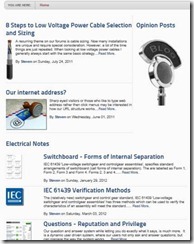Contribute to myElectrcial

Contribute to myElectrical Have an opinion or something to say, want to ask or answer questions, share your knowledge then use our site to do it . As a community of people interested in electrical engineering and related topics it's a great place to make yourself heard.
myElectrical makes contributing easy with a user friendly set of options for adding content. The only requirement to be able to contribute to the site it to register and become a member. Registration is a simple process and the site is completely free.
In addition to being easy, contributing is a great way to promote yourself known and become known throughout the community.
If you want to contribute, there are two main ways to do this:
- Notes Posts
- Questions [and Answers]
Notes Posts
Notes are articles you can write to share your knowledge or pass on some great information. To add a note post to the site, just click the 'Add New Entry' link on the relevant site page.
- To get you going, the following posts may be helpful:
Tip: once you have published your post, it is not fixed. You can always edit and improve the post – this post is one I am updating which I originally published early in 2010.
Questions [and Answers]
Questions [and Answers] are really what they say. If you need to as a question or like to help out by answering you can do so here. Our question and answer system also has an inbuilt reputation system, so you can see your esteem growing question by question (or answer by answer).
Don't be afraid to jump into a discussion. We are a supportive community that likes to encourage our members. To ask a question, just click the "Ask a Question" button in the questions section of the site.
To understand the question and answer system, the following posts may be helpful:
Next Steps
If you a first time contributor, now is a great time to get involved and start building your reputation. If your an established contributor, just keep up the good work.